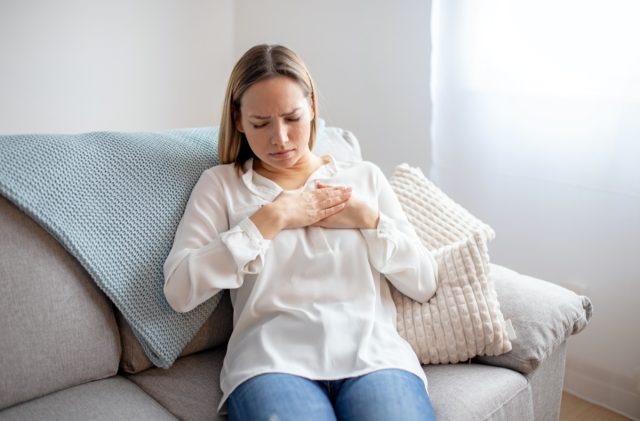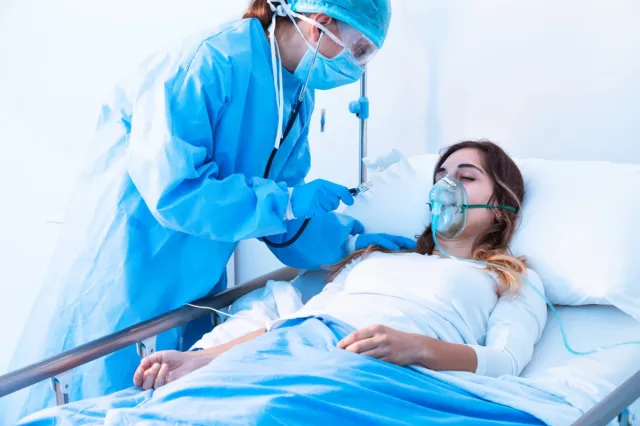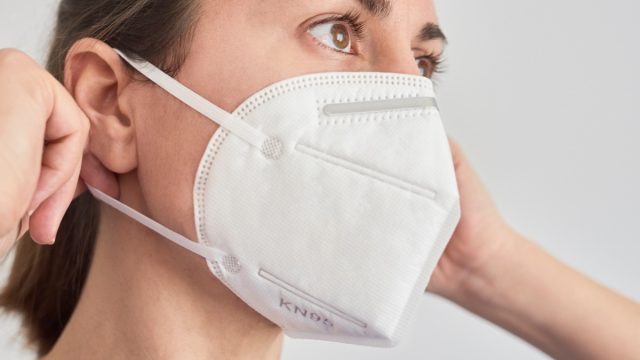The latest COVID-19 surge is finally coming to an end, but that doesn't mean the pandemic is over. COVID is still infecting thousands of people and having long-lasting effects on many. Everyone reacts differently to the virus, but doctors warn if you've been exposed to COVID, here's the symptoms to watch out for. Read below to learn about the signs experts tell Eat This, Not That! Health to be concerned about and to ensure your health and the health of others, don't miss these Sure Signs You've Already Had COVID.

Sean Marchese, MS, RN, a registered nurse at The Mesothelioma Center with a background in oncology clinical trials and over 15 years of direct patient care experience says, "Shortness of breath when impacting daily activities or at rest, should be alarming. This symptom is often a sign that your body isn't receiving enough oxygen. Low oxygen levels can impact the brain, heart and other sensitive organs in the body. One of the toughest medical challenges to face during the COVID-19 pandemic is how quickly patients destabilize when they aren't getting enough oxygen. This virus is insidious for lowering someone's oxygen saturation levels and, after enough time, making it extremely difficult to fully recover. If you're noticing that it's harder to breathe during regular activities or while at rest, seek medical attention immediately. If doctors can manage your oxygen levels early, you have a significantly better chance of a less severe COVID-19 infection."

According to Marchese, "Dizziness, Confusion or 'Brain Fog' are all neurological symptoms that are especially concerning for potential long-term brain damage during or after a COVID-19 infection. These symptoms indicate a problem with higher-level thinking and are potential signs of low oxygen or damaged blood vessels in the brain. Even if you're not experiencing typical COVID-19 symptoms such as cough or shortness of breath, you should talk to your doctor, especially if you're having new difficulties focusing on a task for extended periods or find yourself confused easily and more often. Your doctor can order medical imaging that can reveal potential damage to the brain caused by COVID-19."

"A COVID-19 infection can potentially affect the heart, causing chest pain or heart palpitations," Marchese explains, "There are serious signs to watch out for because they can indicate direct damage to heart tissue that may be irreversible. Heart palpitations can also lead to blood clots or stroke. Some patients have also experienced chest pain after a COVID-19 infection which should not be confused with respiratory symptoms. Chest pain most often indicates a blockage in the heart if not treated quickly. Even if you're not experiencing typical respiratory symptoms of COVID-19, seek immediate medical care if you're having new, worsening or concerning chest pain, dizziness, heart palpitations or numbness and tingling in the extremities."
RELATED: Surprising Reasons You Could Get Cancer, Say Physicians

Harvard Health states, "Strokes occur when the brain's blood supply is interrupted, usually by a blood clot. There have been reports of a greater-than-expected number of younger patients being hospitalized for, and sometimes dying from, serious strokes. These strokes are happening in patients who test positive for coronavirus but who do not have any traditional risk factors for stroke. They tend to have no COVID-19 symptoms, or only mild symptoms. The type of stroke occurring in these patients typically occurs in much older patients.
COVID-related strokes occur because of a body-wide increase in blood clot formation, which can damage any organ, not just the brain. A blood clot in the lungs is called pulmonary embolism and can cause shortness of breath, chest pain, or death; a blood clot in or near the heart can cause a heart attack; and blood clots in the kidneys can cause kidney damage requiring dialysis. One possible reason for COVID-related blood clots may be a disturbance in the levels of a protein, called factor V, that is involved in blood clotting."
RELATED: The CDC Just Changed These Major COVID Rules

According to Harvard Health, "Common symptoms of COVID-19 include fever, dry cough, fatigue, loss of appetite, loss of smell, and body ache. In some people, COVID-19 causes more severe symptoms like high fever, severe cough, and shortness of breath, which often indicates pneumonia.vA person may have mild symptoms for about one week, then worsen rapidly. Let your doctor know if your symptoms quickly worsen over a short period of time. Also call the doctor right away if you or a loved one with COVID-19 experience any of the following emergency symptoms: trouble breathing, persistent pain or pressure in the chest, confusion or inability to arouse the person, or bluish lips or face."
RELATED: Never Do This When Around Your Family, Say Health Experts

Follow the public health fundamentals and help end this pandemic, no matter where you live—get vaccinated or boosted ASAP; if you live in an area with low vaccination rates, wear an N95 face mask, don't travel, social distance, avoid large crowds, don't go indoors with people you're not sheltering with (especially in bars), practice good hand hygiene, and to protect your life and the lives of others, don't visit any of these 35 Places You're Most Likely to Catch COVID.
Health - Latest - Google News
March 03, 2022 at 07:16PM
https://ift.tt/MHfu1OC
COVID Symptoms to be Alarmed About Most — Eat This Not That - Eat This, Not That
Health - Latest - Google News
https://ift.tt/LfhO5dU
Bagikan Berita Ini














0 Response to "COVID Symptoms to be Alarmed About Most — Eat This Not That - Eat This, Not That"
Post a Comment